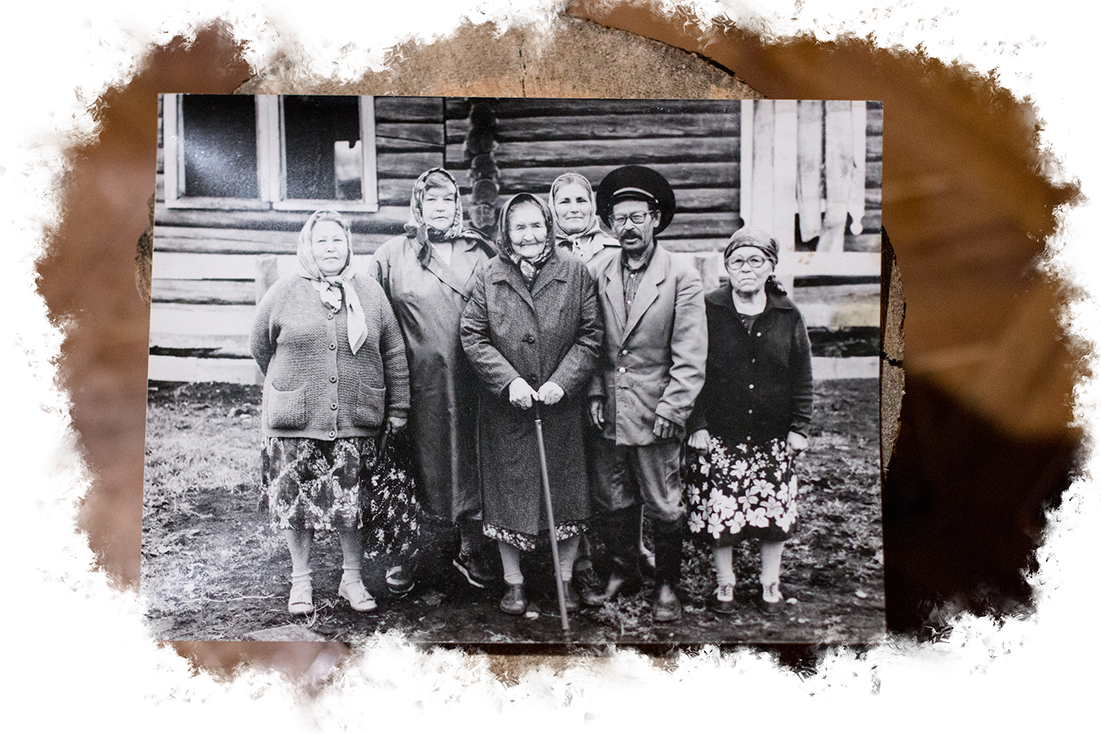
You can’t imagine who we are
One of the smallest nations in the world couldn’t find anyone who would protect their interests
en
The Selkups:
save as...
About
the Project
CONTEXT
TRADITIONS
TROUBLES
he congress and the election of the president of Tomsk Association of Indigenous Small-Numbered Peoples of the North took place in Tomsk at the end of 2017. About 30 representatives of small nations were not allowed to attend the congress. Most of them were going to vote against the current president of the association, Tamara Usatova. After Usatova was was elected for the second term, dissenting Selkups announced their decision to withdraw from the association and established their own non-governmental organization on February 12. According to small-numbered indigenous peoples, what is the fault of the current president? What caused the conflict? How can the association help small-numbered peoples and how should it do?
text:
Galina Sakharevich
photo:
Alisa Zamyslova, Taisia Vorontsova, Alena Kardash
T
The Office for the River People in the Forest
— This is our office; nothing has been done here yet but it’s for free.
The President of the Association Kolta Kup, which is translated as Ob’ Man, shows a one-storey wooden house painted gray-blue. It's located in the countryside, in the village of Timiryazevo. Through the cracks of bricks,
one can see fire in a wood-burning stove in the office; there are small logs instead of chairs, a printer, and a computer on the unpainted plywood. In spite of all this, Tamara Khaimovna is sure that the association will settle down here because she herself was born in the village and has been living her entire life in a detached house. This “office” suits her more than
city offices.
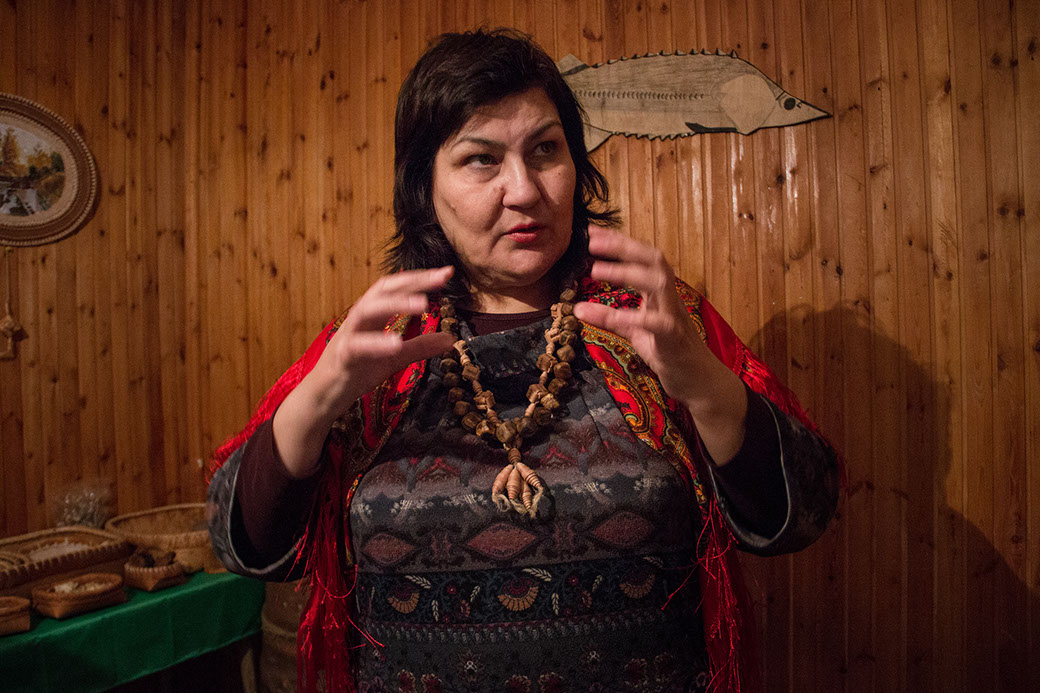
Tamara Usatova, the chairman for the Russian Association of Indigenous Peoples of the North, in her office located in the village of Timiryazevo.
— We are “forest people”, — Tamara Usatova says throwing firewood into the wood-burning stove.
Tamara Usatova has been the head of Tomsk Association of Indigenous Small-Numbered Peoples of the North since 2013. Kolta Kup was established in 1992. At that time, it was negotiated that this organization would include all the small nations of the North. Those who are not related to the indigenous peoples of the North but promote the culture of the Selkups, the Khanty, the Ket, and the Chulym can also be a member.
— I established this non-governmental organization 26 years ago to help my home village, Ivankino, — Zoya Baskonchina, the first president of Kolta Kup, says. — Ivankino was a national Selkup settlement, and I received a grant for the project of Ivankino National Sel’sovet (rural council, translator’s note).
The first National Congress for Indigenous Peoples of the North, in Moscow, 1990.
Support Didn’t Help
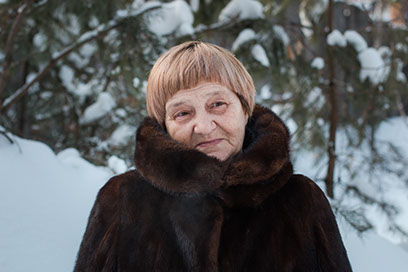
Zoya Baskonchina, the first president of Kolta Kup, Tomsk regional branch for the Russian Association of Indigenous Peoples of the North.
Back there, 26 years ago, the status of a non-governmental organization helped to win grants for small nations.
— We were sent a lot of humanitarian aid; I have pictures in which you can see the Selkups going home with blankets, pillows, — Baskonchina says.
Three years later, Zoya Baskonchina discovered that the Selkups who already had good jobs didn’t need the help of funds, and those who got the help began to take a consumer’s attitude to it. That was the reason why she stopped being engaged in the organization.
— I invited a teacher from the Selkups to Invankino, provided her with accommodation, gave her a cow and a horse for free; but she was not interested in all this. As a result, the cow and the horse died.
Zoya Baskonchina was working as the orphanage principal for a long time. According to her, the representatives of small nations are somehow similar to her pupils:
“The consumer’s attitude corrupts”, Zoya Yermilovna says.
She continues working with small nations but now she doesn’t give them “a fish”, she teaches them how to fish. Baskonchina also teaches the unemployed to weave from rods and make ceremonial dolls, which was the subject of her graduation thesis. Some people came, made a handicraft, and lost their interest in it but despite this, she managed to build a team of 10 craftsmen, who learned how make their living selling their handicrafts, in Kolpashevo.
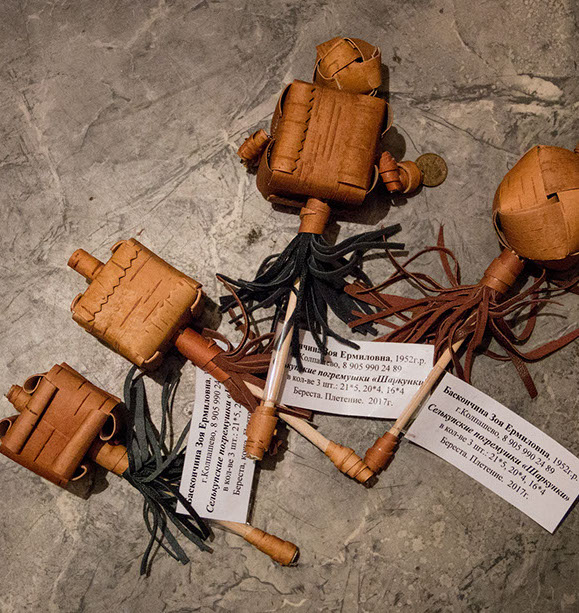
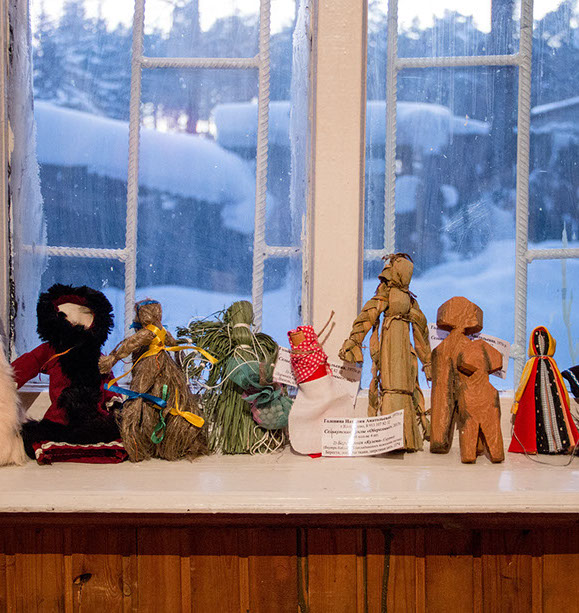
Selkup ritual dolls and rattles are created by students
trained by Zoya Baskonchina.
Selkup ritual dolls and rattles are created by students,
trained by Zoya Baskonchina.
After Baskonchina, a Selkup, Yuri Tobol’zhin from the Mumyshevo yurts (the settlement of an old Selkup family), led the association. He has established national crafts, fishing, and hunting economy and is the leader of Selkup fishermen team.
— We participated in the forums of small-numbered peoples in Canada, Norway, got acquainted with the experience of preserving small nations in these countries, where they live mostly on reserve, — Tobol’zhin says, — I took Selkup ensembles to contests and exhibitions dedicated to small nations to Moscow. I was doing it for 15 years but then I refused because it had negative influence on business. Every time we had to leave for a few weeks, and also I got tired. Each and every time I had to show teams around Moscow, and the most important achievement for them was not the fact that they shared their culture but the thing that they visited the Red Square.
Culture or economy?
After Yuri Tobol’zhin got tired, Tamara Usatova from Kargasok became the president of the association in 2013.
As she tells, she inherited unpaid bills from pension and insurance funds from the previous leaders, which she and other association members
had to pay for.
By that time, Northern Etudes, a festival in Parabel’, had become the main event related to small nations, where indigenous small-numbered peoples came from different regions to perform their songs, dances, and rituals.
According to Usatova, The Northern Etudes has nothing to do with the Selkup culture; dancers just twist their hips, although “our Selkup girls were modest”.
Having become the president, she considered it unacceptable to distribute money to indigenous peoples by the regions of Tomsk Oblast because most of the money was sent to Parabelsky district to organize The Northern Etudes.
The museum center where the festival ‘The Northern Etudes’ is held by the Indigenous peoples of Siberia.
According to Usatova, the association should first and foremost develop the traditional industry, not the culture. Tamara Usatova tries to promote local masters; for example, she takes the works of a bone- and wood-carver to exhibitions that take place everywhere from Moscow to Kamchatka.
His crafts, which are traditional Selkup buildings in miniature, knives made of bone, and carved spoons, are also in the office of Kolta Kup.
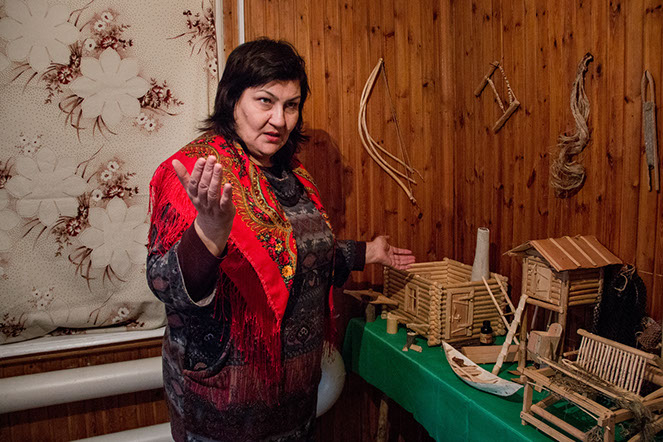
— Open the door, — Tamara Khaimovna says pointing at the wooden Selkup house on the table. — Can you see anything?
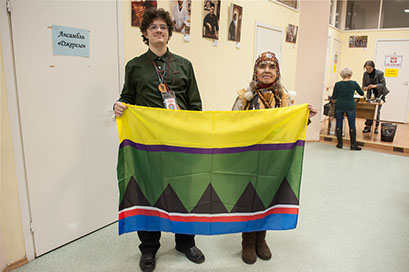
Grigory Korotkikh, a student and a promoter of the Selkup culture, and Nadezhda Izhenbina, a member of the Selkup community, with the Selkup flag.
— In this case we can do this! – she says and takes off the roof of the house, where there is a small piece of a deer skin on a small bench, a round wood-burning stove, and a wooden table.
— It’s a modern Selkup house. Welcome to my world! — Tamara Khaimovna says.
She lives in Karga yurts, where she has founded a fishermen community. During the years of her management, 27 representatives of indigenous peoples have been registered as fishers and two communities have appeared. She has also managed to get an old wooden house that became the office of Kolta Kup. During her new presidential term, Usatova is planning to seek for reserving more natural resource places for indigenous small-numbered peoples of the North.
However, according to the active representatives of indigenous peoples, Tamara Usatova disengage herself from work with indigenous small-numbered peoples of the region.
«She doesn’t bring the members of small nations of the North together, doesn’t inform about events, doesn’t carry out work aimed at the revival, preservation, and development of the culture and language in the regions», — the representatives of the regional branches of the association write to the administration of Tomsk Oblast and the prosecutor's office.
According to those representatives of the indigenous peoples of the North who are not satisfied by the management of the current president, she promotes her own business instead of protecting the interests of minor indigenous peoples.
— You know, when somebody starts working, others think that he or she steals, — Tamara Usatova says.
— The problem is that small nations are not controlled by any department in Tomsk oblast’, — Pavel Rachkovsky, head of the Department of Cultural Heritage and Education of the Department of Culture of Tomsk Oblast, says. — They are considered by the Ministry of Internal Affairs, the Department of Culture and Tourism, and the Department of Natural Resources, but each is responsible for its part and no one is responsible for the situation in general.
Exodus of Dissenters
The re-election of the president of the Association of Indigenous Peoples of the North took place in December 2017. As the representatives of Parabel’ and Kolpashevo branches of the Association of Small-Numbered Peoples of the North say, the organizers violated the terms of the convocation of the congress and did not notify them about it two months in advance, as it is required by the corporate charter.
The exact date had been known by chance about a week before the congress.
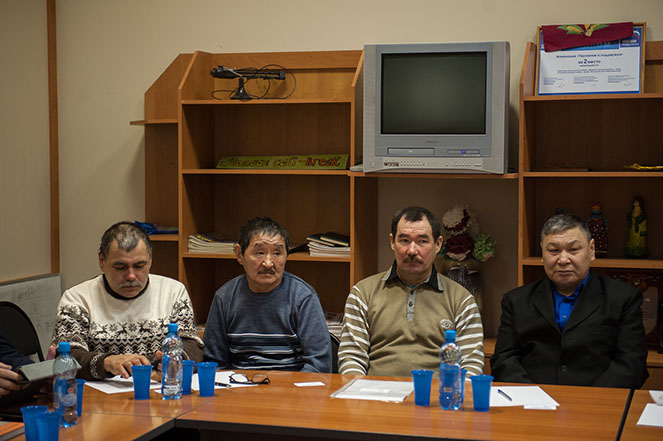
The Congress of the Indigenous Peoples of Siberia,
which not all representatives were allowed to attend.
When the date of the re-election in the districts was found out, the Selkups sent their delegates from Kolpashevo, Parabel’, and Kargasok districts. Having covered 400-500 kilometers, more than 30 representatives of indigenous peoples came to the closed doors: they were not allowed
to get in.
According to the president of the association, under the corporate charter of Kolta Kup, there are allocated quotas for each district. There is one delegate for one hundred representatives of indigenous peoples. Those who arrived from the regions voluntarily were not on the list of delegates, Usatova said. In addition, the room where the congress was held was small and could not hold all comers.
However, the Selkups who were not present at the congress believe that the final decision at the re-elections was made by the members of the association invited personally by Usatova. The opinion of the district delegates representing the interests of more than 1,500 people from the number of indigenous peoples wasn’t taken into account (thus, in total, there are three thousand Selkups in the Russian Federation).
Those who are dissatisfied with Tamara Usatova's presidency announced the establishment of their own non-governmental organization, Kodel Kup, whose recognition is going to be gained at the regional and federal levels.
— This is very strange, — the first president of the association, Zoya Baskonchina, commented, — because no one will recognize several organizations that deal with the same topics, especially the ones related to such small nations.